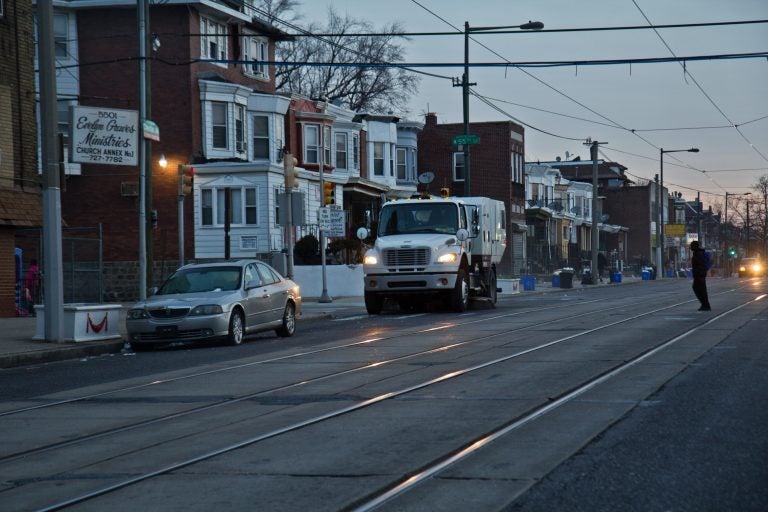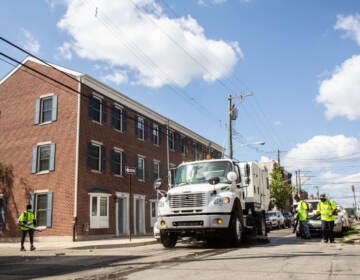Kenney’s street sweeping program may not require moving cars in all neighborhoods
Mayor Jim Kenney’s administration is working out the details for a cleaning program that would treat each neighborhood differently based on a number of factors.
Listen 1:32
A city street sweeper cleans Chester Avenue in Southwest Philadelphia. (Kimberly Paynter)
West Philadelphia resident Tonie Willis is done with cleaning trash from the street outside of her house.
“I’m tired of being the official street sweeper without getting paid for it,” Willis said. “I’m out every Saturday with my dustpan and a broom, sweeping up.”
The West Philly woman was one of many Philadelphia residents thrilled Monday by Mayor Jim Kenney’s pledge to restore street sweeping services in every neighborhood by 2023.
“Listen, we need it, it’s long overdue,” said Willis, who attended Kenney’s second term swearing-in at the Met on North Broad.
But even as residents like Willis celebrate the return of cleaning services, city officials say the large mechanical broom trucks typically used to sweep streets won’t necessarily return to all neighborhoods. The wide vehicles require drivers to move parked cars — a need Mayor Kenney spoke explicitly about Monday.
“It’ll be in every neighborhood and you are going to have to move your car. If you don’t want to move your car — tough,” Kenney said.
Yet city officials say that the street sweeping program remains in development and the final plan could likely involve a mix of mechanical broom trucks and other tools such as the leaf blowers tested in 2019.
Drivers may not be asked to move cars in every neighborhood because needs are “different for each neighborhood,” said Kelly Cofrancisco, a spokesperson for the city, said in an email sent Monday.
“We may have to look at different approaches in different parts of the city based on factors such as the amount of litter, presence of a [community development corporation] or other established cleaning program, etc,” she said.
Philadelphia Managing Director Brian Abernathy offered the same message at a press briefing on Friday.
“Every neighborhood isn’t the same, so every neighborhood will need things slightly different,” Abernathy said. “In some neighborhoods, we will be moving cars and having traditional mechanical street sweeping, this model [the leaf blowers] will continue to be used in certain neighborhoods.”
Cleaning frequency will also depend on neighborhood needs, with some areas cleaned on a weekly basis and others done every month or two.
“Some neighborhoods won’t be done every week but every month or two months depending on what their needs are,” Abernathy said.
The decision about what cleaning looks like in various areas will be based on data, including the city’s Litter Index and feedback from residents, city officials say. Monday, Kenney also committed to using a racial equity lens to make decisions about public investments.
“We will have to do a really robust analysis to understand what [each community’s] needs are, and what each community gets,” said Abernathy.
Philadelphia is the only major American city without a citywide street cleaning program that hits residential streets. The city had gutted its program by the early 2000s due to budgetary concerns and complaints about moving parked cars to make way for the trucks.
Kenney’s move to reinstate neighborhood sweeping comes four years after his first pledge to bring back sweepers, and on the heels of nearly 12 months of cleaning experiments.
Streets Commissioner Carlton Williams said then that the city’s high failure-to-sweep rate was a problem, noting the city’s difficulties enforcing the requirement to move cars.
“That is an issue, that is a concern. We want to make sure that we’re providing the service that we tell the public that they should expect, especially if they’re cooperating by moving their cars,” said Williams.
Then in April, the Kenney administration rolled out a pilot program that brought a new model for cleaning to six neighborhoods. Residents didn’t have to move their vehicles. Instead, city workers used leaf blowers to push trash from under parked cars, where it could then be picked up by a mechanized sweeper. That approach brought controversy too because the handheld blowers are loud and emit particulate pollution.
Kenney acknowledged, Monday, that the blowers were no match for Philadelphia’s trash problem.
“We’ve made some dent in the problem with the handheld blowers and sweepers in the middle of the street but it just isn’t enough,” Mayor Kenney told reporters. “People need to move their cars. They move their cars in Manhattan every week. We can move our cars in Philly.”
The report on the leaf blower pilot is expected in February and another pilot for mechanized street sweeping will be rolled out in the spring. Bringing the service to the whole city will not be immediate, and Kenney expects it will take the full four years to roll out the new sweeping program, whatever it ends up being. The city’s current budget includes $4.3 million for mechanical street sweeping. There is $21.5 million budgeted for sweeping in the city’s five-year plan.
City Councilmembers, also sworn in on Monday, applauded the idea of bringing street sweeping back. Willis’ new representative in West Philadelphia, Jamie Gauthier, said more city sweepers will help her make good on a promise to improve neighborhood corridors.
“I am trying to advance neighborhood business corridors like 52nd Street and it’s really hard to do that when you have so much trash,” said Gauthier, after her inauguration. “I think this is a great initiative that will be helpful for our neighborhood efforts.”
The administration is also supportive of a street cleaning effort championed by Councilmember Charelle Parker, an ally of Mayor Kenney. That initiative will invest $10 million annually in hiring part-time city workers to clean commercial corridors. That policy is expected to go into full effect this year.
WHYY is your source for fact-based, in-depth journalism and information. As a nonprofit organization, we rely on financial support from readers like you. Please give today.







